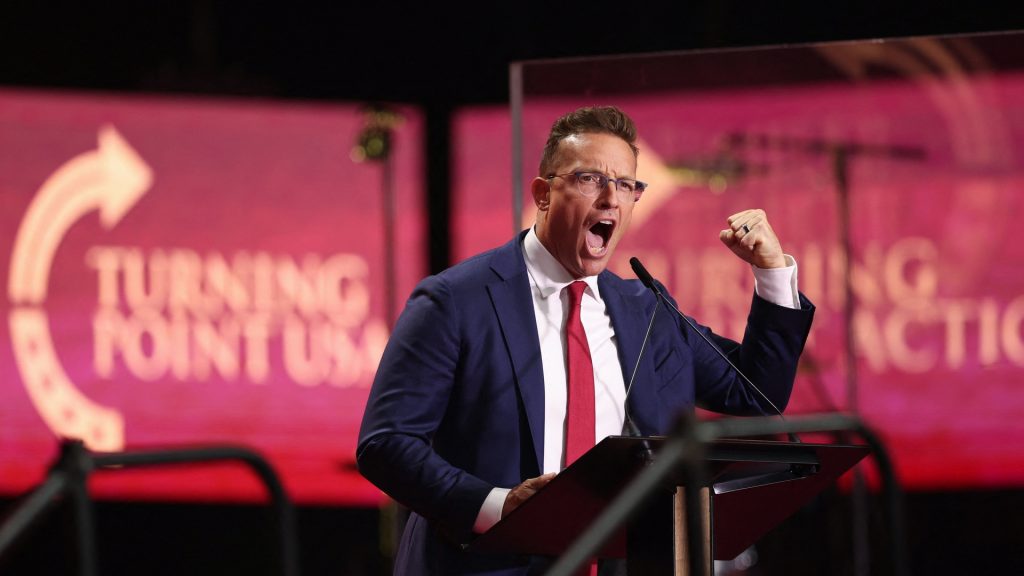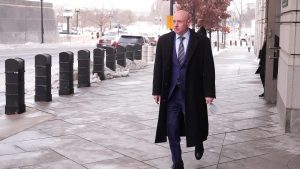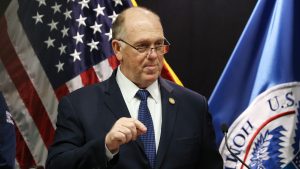MAGA slams ‘fake news’ but embraces ‘The Benny Show’s’ misinformation

As the media landscape widens, members of the Trump administration and its Make America Great Again (MAGA) movement have embraced right-wing podcasters to get their message out. That includes Benny Johnson, whose podcast “The Benny Show” has recently made national headlines.
‘The Benny Show’
Johnson has 12 million subscribers across several platforms, including his podcast, social media and several YouTube channels.
A recent appearance by Department of Homeland Security adviser Corey Lewandowski made headlines when he told Johnson that Immigration and Customs Enforcement (ICE) agents would attend the Super Bowl following the announcement of Bad Bunny as the halftime performer. Department of Homeland Security Secretary Kristi Noem doubled down on that announcement while she was speaking with Johnson.
It was on “The Benny Show” that Brendan Carr, the chairman of the Federal Communications Commission, threatened ABC if it didn’t remove late-night host Jimmy Kimmel from the air over his comments about Charlie Kirk’s accused killer.
“We can do this the easy way or the hard way,” Carr told Johnson.
While MAGA has railed against “fake news,” they’ve clearly embraced podcasters like Johnson, who has a checkered history when it comes to telling the truth.
He got his start at The Blaze, a conservative website founded by former Fox News host Glenn Beck. Johnson then went to Buzzfeed, where he was fired for plagiarism in 41 different articles.
Johnson apologized, but was then accused of plagiarism again three years later at the Independent Journal Review. He was then suspended and demoted for assigning an article that falsely implied former President Barack Obama influenced a federal judge who ruled against President Donald Trump.
He’s also had an article retracted for fake quotes, lied about joining ICE on an immigration raid, promoted election falsehoods, and exaggerated claims of crimes in his neighborhood while living in Washington, D.C.
He’s also one of several influencers who were paid by Russia to produce video content.
Despite that, he was recently welcomed into the White House press briefing room as part of their new media strategy.
SAN reached out to Johnson for comment, but didn’t hear back.
Embracing new media
These days, it’s not uncommon to see politicians on alternative news channels and podcasts, especially members of the Trump administration.
“I think Trump really understood this well before the Democrats understood it, and well before a lot of Republicans even understood it,” said Nolan Higdon, political and media analyst at the University of California, Santa Cruz. “And what he understands is to go to those guys and gals who have the giant platforms. That’s how you get your message out. That’s where a lot of people are.”
In the 1930s, President Franklin D. Roosevelt embraced radio. Decades later, Presidents John F. Kennedy and Ronald Reagan embraced television. Obama was the first president to acknowledge the power of social media.
Now, it’s the digital age, and podcasting is taking center stage.
“It’s vital that politicians and officials don’t limit themselves to the legacy media outlets of past decades,” Seth Stern, director of advocacy at Freedom of the Press Foundation, told Straight Arrow News.
While Stern said that it is critical to getting out your message, choosing whom you speak with is also important.
“There are plenty of independent journalists, podcasters and so on that are doing incredible work,” Stern said. “Benny Johnson’s, of course, not one of them. It was highly ironic to see Brendan Carr go on Benny Johnson’s show to attempt to shake down and threaten a traditional media outlet for what he sees as biased programming.”
Johnson makes no secret of using current Republican talking points on this show, consistently hosting right-wing guests and railing against Democrats. It’s Johnson’s show, and unlike on traditional media outlets, there are no gatekeepers to regulate content.
“Now everyone can share information, and it’s a lot easier to amplify falsehoods, and a lot less opportunity for editors and folks to get in the way and fact check to the question about disinformation,” Higdon said.
While traditional outlets do have those gatekeepers, they don’t always get it right.
“Legacy news media has always had, or, let’s say, always wrestled with trying to find the truth,” Higdon said. “And they’ve made cataclysmic errors, whether it be supporting fascism in the ’30s or lies about Vietnam in the ’70s, or the lies for the [weapons of mass destruction] in the early cable news era.”
Those large networks are also continuously coming under corporate control, opening space for independent news sources.
“We’re seeing more and more that corporate media outlets are unable to resist government pressure and remain independent, and it would be useful for more politicians to engage with the outlets that still can do the kind of independent journalism that our democracy needs,” Stern said.
Traditional media’s decline
Aiding the ascendance of podcasters such as Johnson is the yearslong drop in patronage to legacy media companies. Traditional media outlets such as CBS News, NBC News and ABC News have only seen their viewership decline in the last few years.
While the recent drop is certainly notable, it’s also just a drop in the bucket compared to the viewership decline seen since the 1980s. Each network’s viewership has dropped by at least half.
“It’s no longer like the old days,” Higdon said. “If you could get an interview on CBS in 1975 you could pretty much think you were going to reach like half the country. It was a really big deal. Those days are done now.”
In the 1970s, those three networks, along with PBS, made up the majority of what Americans watched. Cable had just gotten started, and there were certainly no streamers or podcasts.
Fast forward to 2025, and Americans have thousands of options of what to watch and listen to. Research shows that at least a quarter of Americans choose to watch news with a similar viewpoint.
Higdon believes there’s another reason for the shift as well, especially to podcasters.
“They train you in media to look and sound like an expert, even if you’re not one,” Higdon said. “The podcasting space is very different. It’s gritty, it’s authentic, it’s off the cuff. So it takes a certain politician who can succeed in that space, but if you’re able to do that, the way it reads to a lot of the public is, ‘Oh, this person’s just like me, they make jokes. They’re not perfectly articulate, they don’t say the right word all the time.’”
Research shows 70% of Americans have listened to at least one podcast.
During the 2024 campaign, the candidates embraced podcasts.
Former Vice President Kamala Harris appeared on popular podcasts like “Call Her Daddy” and “All The Smoke.” Trump appeared with many popular podcasters, including Joe Rogan and Theo Von.
Trump and ‘fake news’
Trump has had a contentious relationship with the media since his first term, coining the term “fake news.” Despite his objections to fake news, Higdon says Trump’s team has welcomed those who promote fake news like Johnson to help spread their message.
“It’s a huge hypocrisy and contradiction,” Higdon said. “But again, you know it’s not out of the ordinary for authoritarians to do that. I mean, historically, that’s what folks with authoritarian impulses have done.”
While presidents have always preferred positive coverage, Stern said we’ve never seen an administration so open about it.
“We’ve never seen an administration so cavalier about truth and so disdainful towards serious journalists that do anything except recite the party line and flatter them,” Stern said. “We’ve got a president who thinks that excessive criticism of him should be illegal. He said so himself.”
Trump has openly said he’d consider revoking broadcast licenses for networks that cover him in a negative light. Stern added that Trump is trying to change the norms of what an American president can get away with.
“I think plenty of past presidents would have loved to exclude serious journalists from their press conferences and bring in the Benny Johnsons of their time,” Stern said. “They just were under the impression that the public wouldn’t tolerate that, that it would cost them politically. And Trump is attempting to disprove that and say, ‘I can get away with this.’”
America’s response
Stern believes that ultimately, it will be up to the American people to push back on falsehoods and content that can be read as propaganda.
“If Donald Trump or Brendan Carr or whoever wants to go give an interview to Benny Johnson, they’re entitled to do that,” Stern said. “It’s really the public’s job to push back and say, ‘Hey, this is America. We insist on seeing our elected officials answer difficult questions and deal with reality-based lines of inquiry from journalists. This isn’t North Korea. We are not interested in watching our elected officials go on some podcast that deals in flattery and conspiracy theory and carries their water for them.’”
Stern pointed to the recent Kimmel incident as an example of America getting involved.
“I think that was just sort of an easily digestible microcosm of a lot of different things that have been going on in the Trump administration,” Stern said. “And I do think that that backlash caught the administration, and certainly Brendan Carr by surprise.”
Education on spotting falsehoods is also becoming especially important in a world that’s increasingly penetrated by artificial intelligence.
“A lot of our school system was developed specifically for the purpose of strengthening democracy, and sometimes what’s best for your career is not what’s best for democracy,” Higdon said. “And so, I think we really need to think about retooling these institutions to serve democracy, and that necessitates people being able to spot disinformation, being able to spot truth, but also understanding these communications tools that we use.”
The post MAGA slams ‘fake news’ but embraces ‘The Benny Show’s’ misinformation appeared first on Straight Arrow News.





